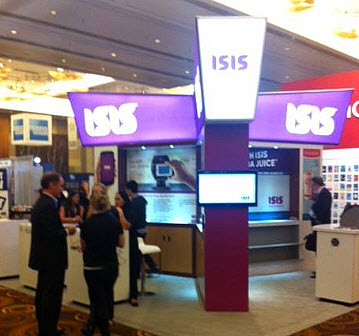The company also stated that it brought in 600,000 new members over the last month.
The Isis mobile wallet joint venture in the Unites States has now released a report that has indicated that it is activating an average of 20,000 new users per day, and that during the last month, it enjoyed an addition of 600,000 members over what it had previously registered.
Isis is the joint venture that brings AT&T Mobility, Verizon Wireless, and T-Mobile U.S. together.
This mobile wallet, like the other giants in this category, had a very slow start, facing far more challenges to adoption than had been anticipated. Now, it is gradually releasing a trickle of data to help to show its marketplace performance since its initial nationwide launch in November. Michael Abbott, the CEO of the company, wrote in a blog post that the current activation rate had reached double what it had been during the month before. That said, the company failed to mention exactly how many total activations had occurred since its NFC technology using mobile payments service became available.
There are now 68 different device models from the telecoms that support the Isis mobile wallet.
At the same time, Isis comes preloaded on 14 smartphones from Verizon, T-Mobile, and AT&T, and the plan is to add even more preloaded devices in the future. In his blog post, Abbott added that “We plan to further broaden our ecosystem of partners to provide customers with more options as well as new ways to save. We’ll continue to offer compelling consumer deals–all with the goal of helping consumers become ever more comfortable with mobile wallets.”
He also explained that in that vein, they will maintain their goal toward innovation to ensure that the users of Isis will be able to take advantage of an experience that is “simple and enjoyable” as they make their product purchases and complete their payment transactions.
A spokesperson for the company underscored the fact that this mobile wallet is now accepted at “hundreds of thousands” of store locations across the country that currently support mobile payments using contactless NFC technology. Some of these include Coca Cola vending machines, Jamba Juice, and even McDonald’s.
A new report has shown that many of the giants in the retail business are looking to location-based applications.
PointInside has now released a report based on their 2013 data that has revealed that apps that use geolocation technology are considerably increasing the engagement that customers have in the interactions with retail stores while the shop, and those retailers have not failed to take notice of the potential that this has to offer.
This year, PointInside has identified a trend that shows that retailers are looking to location based marketing.
Retailers are testing upgrades to their apps that would include geolocation based technology. This allows them to offer in-store modes, location based features, detailed information, interactive store maps, and even the location of products that can be found in the store. The maps can also be customized for the individual user based on shopping lists that he or she has made.
It is clear that geolocation is popping up in the apps of a range of the top retailers.
One prime example of location based marketing worked into an app is from the Lord & Taylor department store chain. They are utilizing third party app developer resources in order to be able to ensure that they boost customer engagement. This, according to Ryan Craver, the senior vice president of corporate strategy.
He explained that “we do need to have a big presence in mobile because everyone has a mobile phone and is doing research.” That company entered into a partnership with SnipSnap in order to be able to expand their presence. They are doing so by offering attractive store coupons that can be redeemed by smartphone users. There are already more than 3 million customers using SnipSnap, according to the data shared by Ted Mann, the chief executive officer of that company.
Another example of a major retailer taking advantage of location based marketing with geolocation technology is Duane Reade, the drug store chain owned by Walgreens. They have recently started the use of apps that have iBeacon integration. This app allows coupons to be shared, as well, and for products to be suggested based on the customer’s specific location inside the store and based on his or her shopping history with that retailer.



